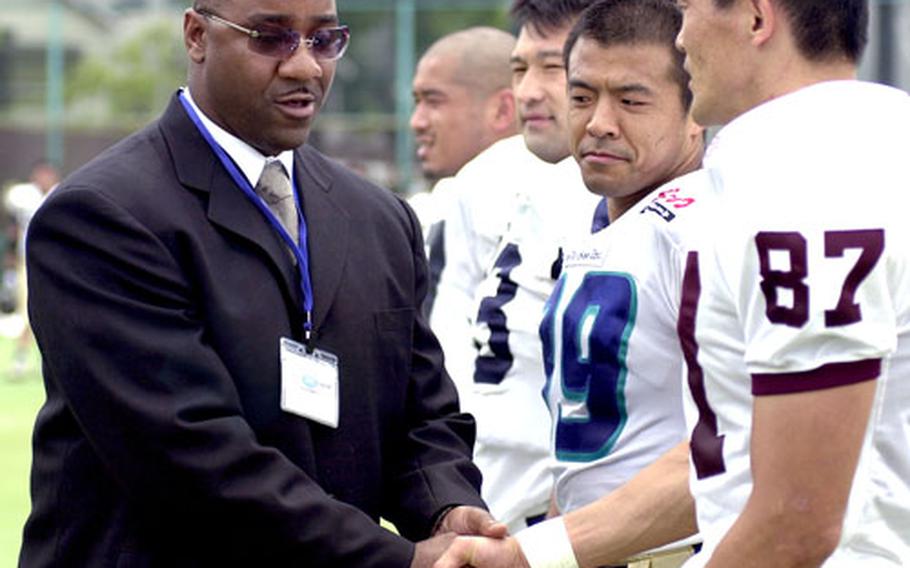
Joe Howell, left, a player and coach in the U.S. Forces Japan-American Football League who also served a term as league commissioner, is leaving Yokota to transfer Altus Air Force Base, Okla. (Dave Ornauer / S&S)
Joe Howell, exiting Japan after eight years at Yokota Air Base, will be remembered many ways by those involved with high school and interservice football:
Defensive end, linebacker and sometime fullback, then later a coach with the Yokota Raiders of the U.S. Forces Japan-American Football League; one year as league commissioner. Yokota High junior varsity assistant coach. And award-winning Air Force non-commissioned officer.
But he also likely will be remembered for something else after Saturday’s Yokota’s Warriors homecoming halftime: the Joe Howell Award for the best defensive lineman in the league.
“This will honor his legacy,” USFJ-AFL commissioner Kyle Rhodus said.
“Big Joe,” as his teammates called the 6-foot-4 280-pounder, is to transfer Wednesday to Altus Air Force Base, Okla.
“He’s meant so much to the league and been an inspiration to a lot of guys, both on and off the field,” said Jacob Dowdell, Raiders quarterback who also coached the Raiders from 2003-2005.
Howell’s years at Yokota arguably represented the best and worst of times, starting with the 1999 season’s first game: He suffered a torn Achilles’ tendon and missed the rest of the campaign.
But noting that the base didn’t support the team, and that players had to pay $300 to suit up, Howell got 374th Airlift Wing commander Col. Mark Zamzow to agree to a proposal that helped all of Yokota’s varsity sports teams regain funding cut off since the early 1990s.
“We’ve had three wing commanders since,” Howell said. “They’ve all seen the need not just for morale … but for the benefits for health and life and physical fitness of the players.”
He chaired meetings in winter 2000 that helped organize USFJ league remnants into the USFJ-AFL and spearheaded a commissioner search that netted Tim Buck, a lawyer at Atsugi Naval Air Facility.
“He clearly believed that the league was more important than any one team,” Buck, now a film producer in Germany, said.
The Raiders reached the USFJ-AFL’s first league title game in 2000, losing 12-6 to Yokosuka. Yokota won only one game the next two seasons and disbanded in August 2002 under the weight of supporting Operation Enduring Freedom.
“We had 50 players, and then all of a sudden, we got hit by deployments and we were down to 12 to 15,” said Howell, who resigned just before the team folded. “Of all the seasons, 2002 was the toughest.”
Yokota returned in 2003 but Howell faced a greater challenge: Buck, transferring to Germany, asked him to be commissioner.
Howell presided over a league that expanded to a record seven teams but which deployments again plunged into disarray. Even the league’s championship game was canceled.
But without Howell, said Rhodus, who took over the league for its 2004 season, “we might not have a league right now.”
That was perhaps the biggest reason the league decided to name an award for Howell, said Rhodus and Dowdell, who proposed the idea. Said Dowdell: “Looking at the guys who have the chance to play football because of his effort to keep the league going, that inspired me to help keep it going for them, too.”
At son Shamarr’s request, Howell joined the Yokota High 2002 season coaching staff, going on to help the Panthers win three of their five Rising Sun Bowls.
He also was selected Air Force command post senior NCO of the year in 2002 and 374th Airlift Wing and 5th Air Force NCO of the Year for 2003. A tech sergeant when he arrived in 1999, he’s to test soon for chief master sergeant.
Howell credits football with helping mold him as a senior NCO. Being league commissioner helped hone his leadership and managerial skills, he said. “At the high school, mentoring young folks … made me more effective mentoring young people in the Air Force. The Air Force will gain and benefit from that.”